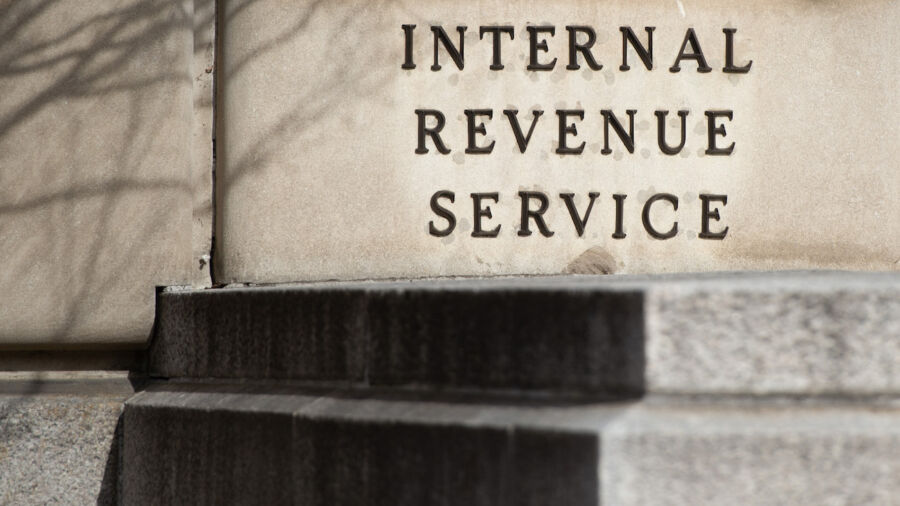The Supreme Court has ruled unanimously in a delinquent taxpayer case that it is lawful for the IRS to secretly summons the bank records of third parties.
In other words, the nation’s highest court recognized that the Internal Revenue Service is not required to notify third parties who are not under investigation when seeking a summons for banking records thought to be relevant to the tax delinquency of another person.
One lawyer who briefed the Supreme Court said the new ruling gives the IRS “startlingly broad authority to pry into the financial records of people who may be only remotely connected to a delinquent taxpayer.”
The ruling, a victory for the Biden administration, came after the administration’s attempts to strengthen IRS enforcement efforts became an issue in the midterm congressional elections. The Inflation Reduction Act, which President Joe Biden signed into law in August 2022, allocated almost $80 billion to the IRS to hire an extra 87,000 agents. Democrats say the IRS has long been underfunded, but Republicans say the extra money will be used to harass taxpayers.
At oral arguments on March 29 the justices had seemed sympathetic to the claim of the wife of a man who owed substantial taxes that the IRS went too far in pursuing her bank records without prior notice. At the same time, they acknowledged the agency needs effective tools to attempt to collect delinquent accounts.
Chief Justice John Roberts wrote the court’s opinion (pdf) in Polselli v. IRS, court file 21-1599, which was issued on May 18.
The IRS claims Remo Polselli owes $2 million in assessed taxes and penalties and issued summonses without notice seeking financial records from banks. His bank records as well as those of his wife, Hanna Polselli, and law firms that performed work for them were sought.
The Biden administration said the IRS does not need to provide notice to third parties and that having to do so would give delinquent taxpayers “a head start in hiding assets.” Besides, the administration argued, persons involved in the process have access to the courts to combat alleged abuses.
Petitioner Hanna Polselli and the law firms argued that the U.S. Court of Appeals for the 6th Circuit departed from a 2000 ruling by the U.S. Court of Appeals for the 9th Circuit, creating a circuit split the Supreme Court needed to resolve.
The 6th Circuit held that the disputed summonses were lawful because they were covered by an exception in the tax code pertaining to third-party record keepers. The 6th Circuit rejected the 9th Circuit’s holding that the exception applies only when the targeted taxpayer has a recognized legal interest in the records.
But the Supreme Court disagreed with Polselli and affirmed the 6th Circuit ruling.
“Congress has given the IRS considerable power to go after unpaid taxes,” Roberts wrote.
“One tool at the Service’s disposal is the authority to summon people with information concerning a delinquent taxpayer. But to safeguard privacy, the IRS is generally required to provide notice to anyone named in a summons, who can then sue to quash it. Today’s case concerns an exception to that general rule.”
The IRS is allowed to request the production of “books, papers, records, or other data” from “any person” who possesses information concerning a delinquent taxpayer, Roberts wrote.
“Given the breadth of this power, Congress has imposed certain safeguards” and generally has to give notice of the summons to any person identified in the summons, who is then entitled to bring a motion to quash the summons. But notice does not have to be provided if the summons is issued in aid of the collection of an assessment made or judgment rendered.
“In other words, the IRS may issue summonses both to determine whether a taxpayer owes money and later to collect any outstanding liability. When the IRS conducts an investigation for the purpose of ‘determining the liability’ of a taxpayer … it must provide notice … But once the Service has reached the stage of ‘collecting any such liability,’ … —which is a distinct activity—notice may not be required.”
Justice Ketanji Brown Jackson filed a separate opinion concurring with the Supreme Court’s judgment. Justice Neil Gorsuch joined her concurring opinion.
Congress has “recognized that there might be situations, particularly in the collection context, where providing notice could frustrate the IRS’s ability to effectively administer the tax laws,” Jackson wrote.
“For instance, upon receiving notice that the IRS has served a summons, interested persons might move or hide collectable assets, making the agency’s collection efforts substantially harder.”
But when writing the tax code, Congress balanced the interests of the IRS and the taxpayer and “did not give the IRS a blank check, so to speak, to do with as it will in the collection arena,” Jackson wrote.
The Epoch Times reached out to Shay Dvoretzky, counsel for Polselli, and the U.S. Department of Justice, which represented the IRS, but had not received a reply from either as of press time.
Paul Sherman, counsel for the Institute for Justice, a nonprofit public interest law firm, expressed alarm at the new ruling. The group filed a friend-of-the-court brief in support of Polselli.
“The Supreme Court’s ruling grants the IRS startlingly broad authority to pry into the financial records of people who may be only remotely connected to a delinquent taxpayer.
“That ruling raises serious Fourth Amendment concerns. Thankfully, the Court stressed that its ruling was narrowly focused on the statutory question before it. In a future case, the Court should address the constitutional limits on the government’s power to demand access to people’s most sensitive financial information.”
The U.S. Chamber of Commerce, which also filed a friend-of-the-court brief in support of Polselli, declined to comment.
From The Epoch Times

